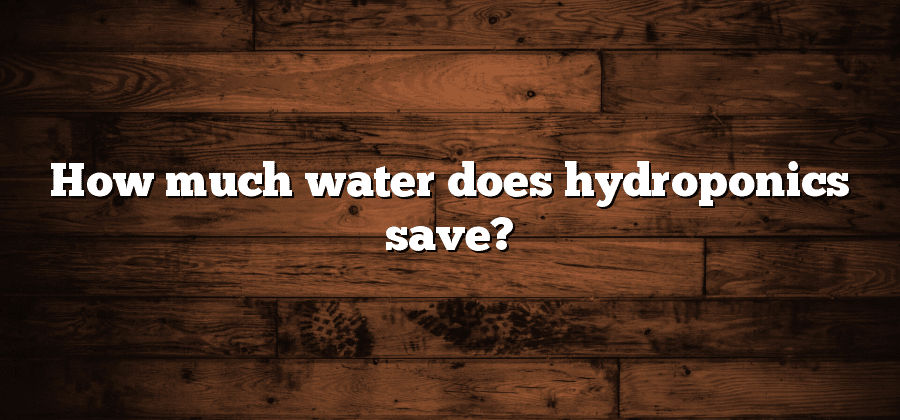Water Conservation Benefits of Hydroponics
Hydroponics, a method of growing plants without soil, offers significant water conservation benefits. Unlike traditional soil-based agriculture, hydroponics allows for precise control over water usage, minimizing waste and maximizing conservation efforts. This is achieved through a combination of factors, including the ability to recirculate and reuse nutrient-rich water, as well as the strategic use of irrigation techniques.
In hydroponic systems, water is delivered directly to the plants’ root systems in a highly efficient manner. This targeted approach eliminates the need for excessive watering, as the plants receive only the necessary amount of water they need to thrive. Additionally, hydroponic systems often incorporate technology such as timers and sensors, which can further optimize water consumption by providing plants with water only when they require it. This not only saves water but also ensures that plants do not suffer from over or under watering, leading to healthier and more productive crops.
By harnessing the power of hydroponics, water usage in agriculture can be significantly reduced. The method’s water conservation benefits make it a sustainable solution for our increasing global water scarcity challenges. With the need to feed a growing population while protecting our natural resources, the implementation of hydroponics offers a promising path towards a more water-efficient future.
Benefits of Hydroponics on Water Usage
Hydroponics has revolutionized agricultural practices by significantly reducing water consumption. In traditional soil-based farming, water can often be lost through evaporation, runoff, and inefficient irrigation systems. However, in hydroponics, water is utilized more efficiently, ensuring minimal waste and maximum conservation.
One of the key benefits of hydroponics on water usage is that it allows for precise control over the amount of water given to plants. Unlike traditional farming methods, where plants draw water from the soil, hydroponics involves growing plants in a nutrient-rich water solution. This solution is circulated directly to the plant roots, providing them with the necessary water and nutrients for growth. By directly supplying water to the roots, hydroponics eliminates the need for excessive watering, leading to significant water savings. Moreover, this controlled system allows farmers to closely monitor and adjust water levels, ensuring plants receive just the right amount of water they need, without any wastage.
The Efficiency of Water Consumption in Hydroponics
Hydroponics, an innovative method of growing plants without soil, has gained popularity in recent years due to its numerous advantages, including its efficiency in water consumption. Unlike traditional soil-based agriculture, hydroponics involves providing plants with nutrient-rich water directly to their roots, eliminating the need for excessive watering. This targeted approach ensures that plants receive exactly the amount of water they need, minimizing water waste and promoting efficient water consumption.
One of the key reasons why hydroponics is more efficient in water consumption is its ability to recirculate water. In traditional farming methods, water is often lost through run-off and evaporation, resulting in significant water waste. However, in hydroponics, water is continuously reused within the system, creating a closed-loop cycle. This not only conserves water but also reduces the need for frequent irrigation, ultimately saving valuable resources in the long run.
Minimizing Water Waste through Hydroponics
As the global population continues to increase, the demand for water also rises drastically. With traditional agriculture methods requiring vast amounts of water, it is crucial to explore alternative approaches that minimize water waste. Enter hydroponics, a soil-less method of growing plants that allows for optimal water conservation.
The key to minimizing water waste through hydroponics lies in its precise control of nutrient delivery to plants. Unlike traditional soil farming where water can easily be lost through runoff or evaporation, hydroponics provides a closed-loop system that recirculates water. This means that nutrient-rich water is continuously supplied to the plants, while any excess is collected and reused. By eliminating the need for excess water usage, hydroponics offers a more efficient solution for water conservation in agriculture.
Water Savings Achieved with Hydroponics
Hydroponics, a soilless method of cultivating plants, has gained popularity due to its remarkable ability to save water. With traditional farming methods, a substantial amount of water is lost through evaporation, runoff, and inefficient irrigation practices. However, hydroponics offers a more efficient solution by providing plants with a controlled and optimized water supply.
In hydroponic systems, water is delivered directly to the roots, minimizing the risk of evaporation and ensuring that plants receive the exact amount of water they need. Additionally, the closed-loop system in hydroponics prevents water runoff, reducing wastage and the strain on water resources. This targeted water delivery approach not only allows for precise control over water consumption but also significantly reduces the overall water requirements compared to traditional farming techniques. As a result, hydroponics stands out as an environmentally friendly and water-efficient alternative for agriculture.






